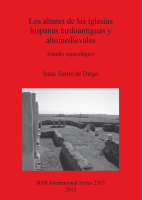Description
BOOK DESCRIPTIONIn this work the author focuses on early Hispanic churches built before the arrival of the Roman Liturgy and the Romanesque techniques by examining liturgical sculptural evidence. This material record provides a detailed understanding of both the functional and constructive features of the churches and leads to a definition of an archaeological methodology for surveying Late Antique and Early Medieval Hispanic churches, a methodology that enables a revision of the traditional historical model based on general stylistic elements that pay little or no attention to spatial context. To illustrate this, the author also makes use of a wide body of research obtained over the last fifteen years undertaken at several Hispanic churches that provides insights into building technology, the most important historical conclusion of which has been the re-dating of the most famous churches of the period. Examples are provided from the churches of San Pedro de la Nave (Zamora), Santa María de Quintanilla de las Viñas (Burgos), San Juan de Baños (Palencia), Santa Comba de Bande (Orense), Santa María de Melque (Toledo), and Santa Lucía del Trampal (Cáceres).











